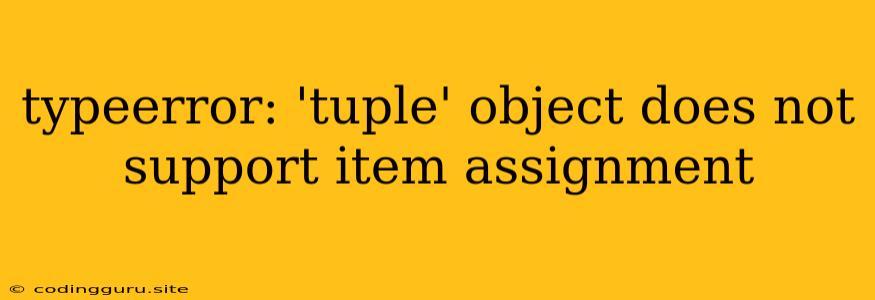The "TypeError: 'tuple' object does not support item assignment" in Python
The error message "TypeError: 'tuple' object does not support item assignment" is a common hurdle encountered in Python programming. It signifies that you're attempting to modify an element within a tuple, which is fundamentally forbidden. Understanding why this happens and how to address it is key to efficient Python development.
What are Tuples?
In Python, tuples are ordered, immutable sequences of elements. Think of them as containers that hold a collection of objects in a specific order. The immutability aspect is crucial. Once you define a tuple, you cannot change its individual elements after the fact. This is unlike lists, which are mutable and allow for modifications.
Why the Error Occurs
The heart of the problem lies in the immutable nature of tuples. When you write code that tries to change a value inside a tuple using an assignment operator (e.g., my_tuple[0] = 'new_value'), Python throws the "TypeError: 'tuple' object does not support item assignment" error because it's designed to prevent accidental alterations to the tuple's structure.
Practical Example
my_tuple = (10, 20, 30)
my_tuple[1] = 40 # This line will trigger the error
print(my_tuple)
This code snippet demonstrates the problem. We try to assign the value 40 to the second element (index 1) of the tuple my_tuple. This action violates the immutability rule of tuples, leading to the error.
Troubleshooting and Solutions
-
Recognize the Problem: The first step is to pinpoint the lines of code where you're trying to assign values to tuple elements. Carefully examine your code, looking for assignments within tuple brackets:
my_tuple[index] = new_value. -
Embrace Immutability: Understand that the error arises because tuples are inherently unchangeable. If you need a collection of items where elements can be modified, use a Python list instead.
-
Alternatives for Modification:
- Conversion to List: If you need to alter tuple elements, temporarily convert the tuple into a list, modify the list, and then convert it back to a tuple.
my_tuple = (10, 20, 30) my_list = list(my_tuple) my_list[1] = 40 my_tuple = tuple(my_list) print(my_tuple) # Output: (10, 40, 30)- Tuple Concatenation: Create a new tuple by combining the original tuple with new elements using the
+operator.
my_tuple = (10, 20, 30) new_tuple = my_tuple + (40,) # Add a single element print(new_tuple) # Output: (10, 20, 30, 40)
Common Mistakes to Avoid
- Assignment Within a Tuple: Be cautious not to confuse tuple assignment with assigning a whole new tuple. For example, this is valid:
my_tuple = (10, 20, 30) my_tuple = (10, 40, 30) # This assigns a completely new tuple print(my_tuple) # Output: (10, 40, 30)
When to Use Tuples
Tuples shine in scenarios where you want to ensure data integrity and prevent accidental changes. Here are some key use cases:
- Representing Immutable Data: If you have data that should remain constant, tuples are the perfect choice.
- Keys in Dictionaries: Tuples are commonly used as keys in dictionaries due to their immutability.
- Returning Multiple Values from Functions: Functions can return multiple values as a tuple, enhancing code clarity.
Conclusion
The "TypeError: 'tuple' object does not support item assignment" error is a reminder that tuples are designed for holding unchanging data. While this can feel restrictive, it's a fundamental aspect of Python's tuple structure. By understanding this concept, you can avoid this error and effectively leverage tuples in your Python programs.
